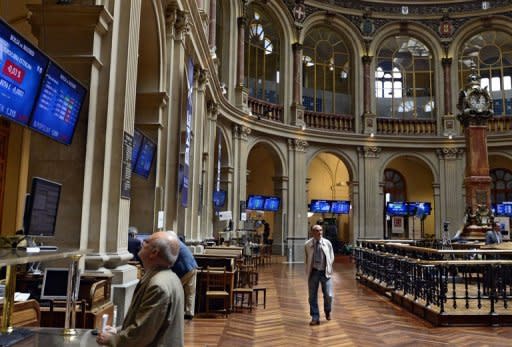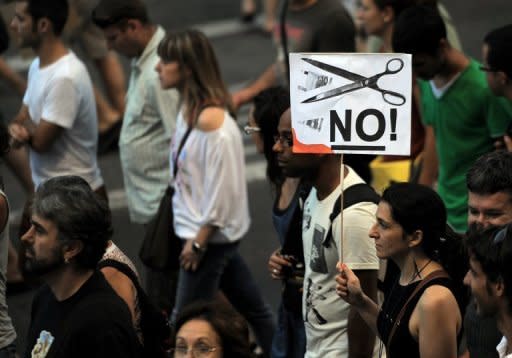World markets slide on rising Spain tensions
World stocks fell sharply, the euro hit a 12-year low against the yen and Spanish borrowing costs reached record highs Monday on speculation Spain could soon require a full state bailout. "It's been a while since we've had a session this worrying which reminds us of the crazy days of last summer," analyst Andrea Tueni of Saxo Bank said. "Spain is panicking markets which are wondering how the country can escape a full blown rescue plan and not only have one for its banks," he said. Eyes were also on bailed-out Greece, with auditors from the European Union, International Monetary Fund and the European Central Bank due in Athens this week for another inspection of the new government's economic programme. The report will determine whether Greece will receive fresh loans of 31.5 billion euros by September due under its debt rescue programme. German Finance Minister Wolfgang Schaeuble warned Greece in a newspaper interview Monday that it must redouble efforts to comply with bailout conditions imposed by international creditors. "If there were delays, Greece must make up for them," he told the Bild. European stock markets closed sharply lower with London's benchmark FTSE 100 index of top companies down 2.09 percent at 5,533.87 points. In Frankfurt, the DAX 30 lost 3.18 percent at 6,419.33 points and in Paris the CAC 40 slumped 2.89 percent to 3,101.53 points. Madrid's IBEX 35 index plunged more than 5.0 percent before recovering, ending the day down 1.10, percent and Athens dived over 7.0 percent. US stocks also dived with the Dow Jones Industrial Average tumbling 1.24 percent and the tech-rich Nasdaq down 1.95 percent in midday trade. "Europe reared its ugly head again, as the crisis in Spain grabbed headlines," said Tony Venosa at Schaeffer's Investment Research. The market turmoil prompted both Spain and Italy to impose bans on the short-selling of stocks. In short-selling, investors are betting that a stock will fall in price, which critics say only adds to the downward pressure in falling markets. France said it would refrain from a ban for now. In foreign exchange deals, the European single currency fell to a two-year low at $1.2067, though recovered to $1.2111 compared with $1.2152 in New York late Friday. The euro also slumped to its lowest level against Japan's safe-haven currency in almost 12 years -- hitting 94.24 yen, but later it regained to 94.99 from 95.42 yen on Friday. Spanish long-term borrowing costs jumped to record highs as investors turned increasingly sceptical about government efforts to stabilise a stricken banking system and the public finances. The yield -- the rate of return -- on the benchmark Spanish 10-year government bond jumped to 7.498 percent from 7.225 percent on Friday, well above the 7.0 percent danger level for long-term funding. "Investors fear that the eurozone's fourth largest economy is soon to follow Greece, Ireland, and Portugal in requesting emergency funding, with yields on ten-year debt fast approaching 7.5 percent," said Spreadex trader David White. Spain's economic slump deepened in the second quarter of 2012 as consumers cut back spending, the Bank of Spain said Monday. Gross domestic product shrank 0.4 percent in the second quarter from the previous three months, after contracting 0.3 percent in the first, the central bank said in its latest monthly bulletin. In Asian trade, Hong Kong led the losses, closing down 2.99 percent. Tokyo shed 1.86 percent, Seoul lost 1.84 percent and Sydney dropped 1.67 percent. Market players were also spooked after one of Spain's indebted regions, Valencia, said it would ask the central government for financial support while reports that Murcia would also seek help were denied. "Just as the bailout plan for Spanish banks was finished, we are now confronted with the problems of the Spanish regions with Valencia, which has requested financial support, and other regions that may follow," said trader Yves Marcais with Global Equities. "This doesn't end, and the market is completely overwhelmed," he said.




